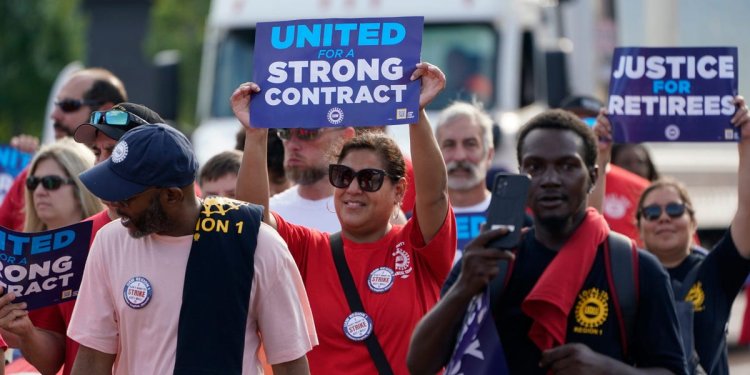Gen Z like 'safety capitalism.' It's a lot like what we have now but with more help for people who lose their jobs or get sick.
Gen Z is embracing "safety capitalism" because they think the current social safety net is insufficient.

AP Photo/Paul Sancya
- Some Gen Zers have grown critical of capitalism in recent years.
- Rather than dismiss the whole system, many are embracing an idea one researcher calls "safety capitalism."
- Gen Zers are less likely to take certain risks, which could be one reason they want more of a social safety net.
When someone loses their job or can't work for health reasons, how much government support should they receive? If you ask many Gen Zers that question, they'll say the current social safety net is insufficient.
Christina Elson, executive director of the Center for the Study of Capitalism at Wake Forest University, told Business Insider that many young people have embraced an idea she calls "safety capitalism."
The theory behind safety capitalism is that a successful capitalist system can and should provide sufficient protection — or safety — for those who need support following circumstances like a job loss or illness. One of the key questions facing any economic system is, "What should failure look like," Elson asked.
While many Americans receive support from a variety of social programs such as unemployment, food stamps, or disability, some of these have been scaled back since the height of the pandemic. As things stand, many Gen Zers think the US's social safety net is inadequate.
Sixty-five percent of Gen Zers think the government should provide a job to anyone who wants one, according to a Wake Forest survey of 2,000 Gen Zers and millennials conducted with YouGov in 2022. Forty-five percent said they had a positive impression of universal basic income policies. In a 2023 survey conducted by the same group, 65% percent of Gen Zers said unemployment payments should match one's salary.
Most Gen Zers still support capitalist ideas like private home ownership and entrepreneurship, Elson said. But many are frustrated with how the high costs of things like healthcare, housing, and education have taken a financial toll on Americans — and think these systems could benefit from more government intervention.
"You hear about 'billionaires should be outlawed' — that really isn't the issue," Elson previously told BI regarding Gen Zer's concerns. "The issue is the bottom. What is the appropriate bottom living standard for an American citizen, and what role should the government have in ensuring that people don't fall below that?"
Some are even turning away from capitalism altogether. In a Business Insider survey conducted last July of over 1,800 Americans, 28% of Gen Z respondents said they somewhat or strongly preferred the economic system of socialism over capitalism, the most of any generation. Twenty-nine percent of Gen Zers preferred capitalism — the rest didn't have a preference or weren't sure.
Why Gen Z wants an expanded safety net
Compared to past generations, young people today are less likely to drive, drink, have sex, and more likely to live at home, per some surveys. Elson said these examples point to a level of risk aversion that may be unique to Gen Zers.
"Gen Z are 'younger for longer,' — they go out into the world slower," she said, adding, "What is it that this generation needs in order to feel that they're able to go out there and take risks?"
Elson said many Gen Zers seek a "redesign of social safety" to enhance what some feel is an outdated system. For example, unemployment insurance and Social Security were introduced nearly 90 years ago during the Great Depression.
The financial challenges currently facing the Social Security system — due in part to the US's aging population — are arguably further evidence of a system that's in need of reform.
"All of this network has been designed for another time and place," Elson said.
Exactly what, if any, changes the US should make to its social safety net is up for debate. Some young people may look to Europe, where countries generally have a larger social safety net than the US.
In Germany, eligible unemployed individuals receive between 60% and 67% of their previous salary for up to a year. Policies like universal health insurance and guaranteed sick leave are also more common in Europe. Before temporary changes were enacted during the pandemic, most US states offered six months of unemployment benefits, with Americans collecting an average of $372 a week, per PBS.
Regardless, Elson said it's important that the US's entrepreneurial culture — which can reward risk-taking and drive economic progress — remains intact.
Most businesses fail, but as prominent investor Charlie Munger once said — and Elson referenced in a recent post — a level of failure may be necessary to have a thriving economy.
"Capitalism without failure is like religion without hell," Munger said.
What's Your Reaction?




















